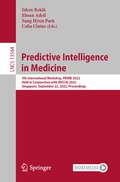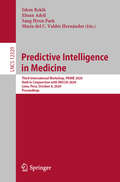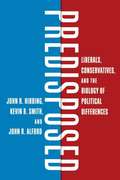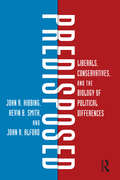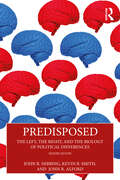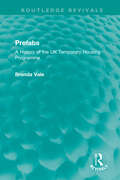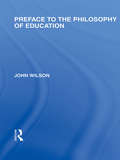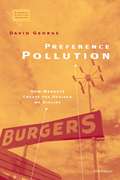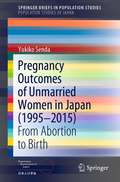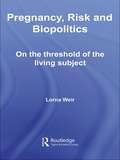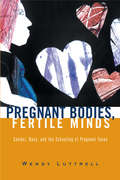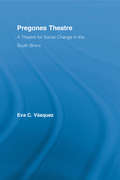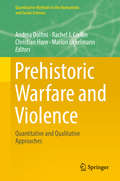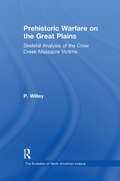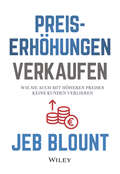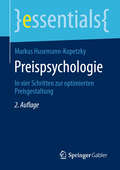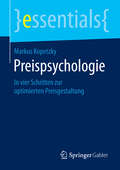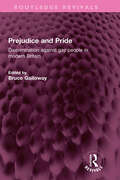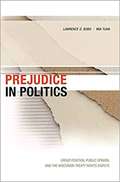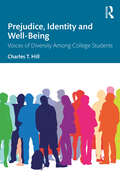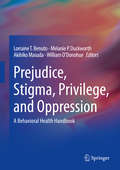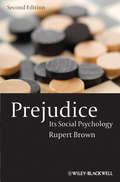- Table View
- List View
Predictive Intelligence in Medicine: 5th International Workshop, PRIME 2022, Held in Conjunction with MICCAI 2022, Singapore, September 22, 2022, Proceedings (Lecture Notes in Computer Science #13564)
by Ehsan Adeli Islem Rekik Sang Hyun Park Celia CintasThis book constitutes the proceedings of the 5th International Workshop on Predictive Intelligence in Medicine, PRIME 2022, held in conjunction with MICCAI 2022 as a hybrid event in Singapore, in September 2022.The 19 papers presented in this volume were carefully reviewed and selected for inclusion in this book. The contributions describe new cutting-edge predictive models and methods that solve challenging problems in the medical field for a high-precision predictive medicine.
Predictive Intelligence in Medicine: Third International Workshop, PRIME 2020, Held in Conjunction with MICCAI 2020, Lima, Peru, October 8, 2020, Proceedings (Lecture Notes in Computer Science #12329)
by Ehsan Adeli Islem Rekik Sang Hyun Park Maria del C. Valdés HernándezThis book constitutes the proceedings of the Second International Workshop on Predictive Intelligence in Medicine, PRIME 2020, held in conjunction with MICCAI 2020, in Lima, Peru, in October 2020. The workshop was held virtually due to the COVID-19 pandemic. The 17 full and 2 short papers presented in this volume were carefully reviewed and selected for inclusion in this book. The contributions describe new cutting-edge predictive models and methods that solve challenging problems in the medical field for a high-precision predictive medicine.
Predisposed: Liberals, Conservatives, and the Biology of Political Differences
by Kevin B. Smith John R. Hibbling John R. Alford<p>Buried in many people and operating largely outside the realm of conscious thought are forces inclining us toward liberal or conservative political convictions. Our biology predisposes us to see and understand the world in different ways, not always reason and the careful consideration of facts. These predispositions are in turn responsible for a significant portion of the political and ideological conflict that marks human history. <p>With verve and wit, renowned social scientists John Hibbing, Kevin Smith, and John Alford―pioneers in the field of biopolitics―present overwhelming evidence that people differ politically not just because they grew up in different cultures or were presented with different information. Despite the oft-heard longing for consensus, unity, and peace, the universal rift between conservatives and liberals endures because people have diverse psychological, physiological, and genetic traits. These biological differences influence much of what makes people who they are, including their orientations to politics. <p>Political disputes typically spring from the assumption that those who do not agree with us are shallow, misguided, uninformed, and ignorant. Predisposed suggests instead that political opponents simply experience, process, and respond to the world differently. It follows, then, that the key to getting along politically is not the ability of one side to persuade the other side to see the error of its ways but rather the ability of each side to see that the other is different, not just politically, but physically. Predisposed will change the way you think about politics and partisan conflict. <p>As a bonus, the book includes a "Left/Right 20 Questions" game to test whether your predispositions lean liberal or conservative.</p>
Predisposed: Liberals, Conservatives, and the Biology of Political Differences
by Kevin B. Smith John R. Alford John R. HibbingBuried in many people and operating largely outside the realm of conscious thought are forces inclining us toward liberal or conservative political convictions. Our biology predisposes us to see and understand the world in different ways, not always reason and the careful consideration of facts. These predispositions are in turn responsible for a significant portion of the political and ideological conflict that marks human history. With verve and wit, renowned social scientists John Hibbing, Kevin Smith, and John Alford—pioneers in the field of biopolitics—present overwhelming evidence that people differ politically not just because they grew up in different cultures or were presented with different information. Despite the oft-heard longing for consensus, unity, and peace, the universal rift between conservatives and liberals endures because people have diverse psychological, physiological, and genetic traits. These biological differences influence much of what makes people who they are, including their orientations to politics. Political disputes typically spring from the assumption that those who do not agree with us are shallow, misguided, uninformed, and ignorant. Predisposed suggests instead that political opponents simply experience, process, and respond to the world differently. It follows, then, that the key to getting along politically is not the ability of one side to persuade the other side to see the error of its ways but rather the ability of each side to see that the other is different, not just politically, but physically. Predisposed will change the way you think about politics and partisan conflict. As a bonus, the book includes a "Left/Right 20 Questions" game to test whether your predispositions lean liberal or conservative.
Predisposed: The Left, The Right, and the Biology of Political Differences
by Kevin B. Smith John R. Alford John R. HibbingThis thoughtfully updated revision of a classic text sheds new light on the potential sociological and biological differences that result in deep, seemingly unbridgeable political divisions.Renowned social scientists and experts in biopolitics, John R. Hibbing, Kevin B. Smith, and John R. Alford present overwhelming evidence that political opinion is shaped not just by cultural background or information bias but is rather the result of diverse psychological, physiological, and genetic traits. This new edition shifts the emphasis from differences between the political left and the right (liberals and conservatives) as they have traditionally been understood and explores specific brands of liberalism and conservatism such as ardent supporters of politicians such as Donald Trump.An essential read for students and scholars of political psychology and party politics, this book invites the reader to reconsider their perspectives on public opinion and partisan conflict.
Prefabs: A History of the UK Temporary Housing Programme (Routledge Revivals)
by Brenda ValeOriginally published in 1995, this book unravels the history of the ‘temporary bungalow’ and shows that perhaps it was more a question of providing a new peace-time product for factories than a means of providing accommodation for the homeless. Built in a period of housing history which remains fascinating for architects and planners and admired by some of their first occupants but berated by others, those prefabs remaining today are subject to preservation orders but also perhaps offer a solution to the ongoing housing crisis in the UK. The book includes chapters on the development of the prefab house in the UK; comparisons with temporary housing programmes in the USA, Sweden and Germany; political and economic considerations to the UK Temporary Housing Programme and a discussion of the design of the Arcon, Uni-Seco, Tarran and Aluminium Temporary Bungalows.
Preface to the philosophy of education (International Library of the Philosophy of Education Volume 24)
by John WilsonIt is sometimes said that the philosophy of education is not a serious and coherent philosophical area of inquiry. John Wilson examines this argument, taking it as the starting point for his book. He believes that most 'philosophy of education' until now has been little more than the promotion of particular ideologies, and that progress can be made only by a more analytical approach. The central problems lies in establishing a few basic concepts, principles and categories and questions which will form the skeleton of the subject. He therefore outlines the nature of 'philosophy of education' and defines some of its major problems by examining key notions such as the value of education, the nature and implications of learning and what should be learned.
Preference Pollution
by David GeorgeSeldom considered is whether markets do an adequate job of shaping our tastes. David George argues that they do not, and that the standard economic definition of efficiency can be used to demonstrate that the market ignores people's desires about their desires. He concludes that markets perform poorly with respect to second-order preferences, thus worsening the problem of undesired desires. The book further investigates changes in perceptions and public policy toward such activities as gambling, credit, entertainment, and sexual behavior.
Preference, Value, Choice, and Welfare
by Daniel M. HausmanThis book is about preferences, principally as they figure in economics. It also explores their uses in everyday language and action, how they are understood in psychology and how they figure in philosophical reflection on action and morality. The book clarifies and for the most part defends the way in which economists invoke preferences to explain, predict and assess behavior and outcomes. Hausman argues, however, that the predictions and explanations economists offer rely on theories of preference formation that are in need of further development, and he criticizes attempts to define welfare in terms of preferences and to define preferences in terms of choices or self-interest. The analysis clarifies the relations between rational choice theory and philosophical accounts of human action. The book also assembles the materials out of which models of preference formation and modification can be constructed, and it comments on how reason and emotion shape preferences.
Prefiguring the Idea of the University for a Post-Capitalist Society (Marxism and Education)
by Gary SaundersUsing an Open Marxist theoretical framework, this book provides a critique of the neoliberal reforms made to higher education since the late 1970s and the impact this has had on the sector. Rather than arguing for a return to the idea of the public university, the book argues that public and private models of higher education are both forms of capitalist accumulation and have historically perpetuated forms of oppression, exploitation and discrimination; thus, a more radical solution that addresses both the current crisis of higher education and the contradictory and exploitative nature of late capitalism is required. This book critically examines the autonomous learning spaces that emerged out of the UK student protests (2009-2010) and documents what can be learned from them to prefigure the idea of the university for a post-capitalist society.
Pregnancy Outcomes of Unmarried Women in Japan: From Abortion to Birth (SpringerBriefs in Population Studies)
by Yukiko SendaThis book provides a key to understanding why there was an increase in extra-marital fertility in Japan from the 1990s to the 2010s, particularly between 1995 and 2015, and the factors which contribute to the multistratification of unmarried mothers, the number of which has increased ensuingly. It also allows for international comparison by providing data on outcomes of extra-marital childbirth. Previously, it was believed that the idea of a ‘second demographic transition’ did not apply to Japan, which had a relatively low rate of extra-marital fertility. However, more recently, though still at a low level, a subtle but gradual rise is seen in the number of women who become unmarried mothers as a result of births outside marriage. This trend suggests that the social environment surrounding pregnancy, childbirth, and marriage is changing. In this book, various data such as national statistics, nationwide surveys, and media discourse are analysed with a view to revealing the factors affecting unmarried women’s decisions when they discover they are pregnant. Various matters are discussed, such as changes in sexual activity and contraceptive use, advance in reproductive technology, the law and government policies pertaining to adoption, social consciousness towards unwed mothers, the change in perception of abortion from the religious perspective, and difference of socioeconomic status depending on the women’s occupation. Facts from vital statistics are first laid out, showing that, while abortion has consistently been on the decrease from the 1990s onward, shotgun marriages have peaked out. Adoption is rare and remains very small in proportion, while extra-marital fertility is on the rise. The author then points to the possibility that greater lenience found in the social consciousness towards unwed mothers in recent years is a pull factor for the increase in extra-marital fertility. Further, by analysing vital statistics, it is revealed that the probability of becoming a mother without marrying changed with the woman’s occupation, explicable by the stability of employment and level of income, and that between 1995 and 2015, the effects of the job factor are changing. If we assume that, unlike the first demographic transition model, the ‘second demographic transition’ may show a similar direction but be on a different scale according to the country, it is possible to say that Japan too is experiencing the ‘second demographic transition’.
Pregnancy in Practice
by Sallie HanBabies are not simply born-they are made through cultural and social practices. Based on rich empirical work, this book examines the everyday experiences that mark pregnancy in the US today, such as reading pregnancy advice books, showing ultrasound "baby pictures" to friends and co-workers, and decorating the nursery in anticipation of the new arrival. These ordinary practices of pregnancy, the author argues, are significant and revealing creative activities that produce babies. They are the activities through which babies are made important and meaningful in the lives of the women and men awaiting the child's birth. This book brings into focus a topic that has been overlooked in the scholarship on reproduction and will be of interest to professionals and expectant parents alike.
Pregnancy, Risk and Biopolitics: On the Threshold of the Living Subject (Transformations)
by Lorna WeirTraditionally, Euroamerican cultures have considered that human status was conferred at the conclusion to childbirth. However, in contemporary Euroamerican biomedicine, law and politics, the living subject is often claimed to pre-exist birth. In this fascinating book Lorna Weir argues that the displacement of birth as the threshold of the living subject began in the 1950s with the novel concept of ‘perinatal mortality’ referring to death of either the foetus or the newborn just prior to, during or after birth. Weir’s book gives a new feminist approach to pregnancy in advanced modernity focusing on the governance of population. She traces the introduction of the perinatal threshold into child welfare and tort law through expert testimony on foetal risk, sketching the clash at law between the birth and perinatal thresholds of the living subject. Her book makes original empirical and theoretical contributions to the history of the present (Foucauldian research), feminism, and social studies of risk, and she conceptualizes a new historical focus for the history of the present: the threshold of the living subject. Calling attention to the significance of population politics, especially the reduction of infant mortality, for the unsettling of the birth threshold, this book argues that risk techniques are heterogeneous, contested with expertise, and plural in their political effects. Interview research with midwives shows their critical relation to using risk assessment in clinical practice. An original and accessible study, this book will be of great interest to students and researchers across many disciplines.
Pregnant Bodies, Fertile Minds: Gender, Race, and the Schooling of Pregnant Teens
by Wendy LuttrellFocusing on fifty girls enrolled in a model public school program for pregnant teens, Luttrell explores how pregnant girls experience society's view of them and also considers how these girls view themselves and the choices they've made. Also includes an 8-page color insert.
Pregones Theatre: A Theatre for Social Change in the South Bronx (Latino Communities: Emerging Voices - Political, Social, Cultural and Legal Issues)
by Eva Cristina VásquezFirst published in 2004. Routledge is an imprint of Taylor & Francis, an informa company.
Prehistoric Warfare and Violence: Quantitative and Qualitative Approaches (Quantitative Methods in the Humanities and Social Sciences)
by Christian Horn Andrea Dolfini Rachel J. Crellin Marion UckelmannThis is the first book to explore prehistoric warfare and violence by integrating qualitative research methods with quantitative, scientific techniques of analysis such as paleopathology, morphometry, wear analysis, and experimental archaeology. It investigates early warfare and violence from the standpoint of four broad interdisciplinary themes: skeletal markers of violence and weapon training; conflict in prehistoric rock-art; the material culture of conflict; and intergroup violence in archaeological discourse. The book has a wide-ranging chronological and geographic scope, from early Neolithic to late Iron Age and from Western Europe to East Asia. It includes world-renowned sites and artefact collections such as the Tollense Valley Bronze Age battlefield (Germany), the UNESCO World Heritage Site at Tanum (Sweden), and the British Museum collection of bronze weaponry from the late Shang period (China). Original case studies are presented in each section by a diverse international authorship.The study of warfare and violence in prehistoric and pre-literate societies has been at the forefront of archaeological debate since the publication of Keeley’s provocative monograph ‘War Before Civilization’ (Oxford 1996). The problem has been approached from a number of standpoints including anthropological and behavioural studies of interpersonal violence, osteological examinations of sharp lesions and blunt-force traumas, wear analysis of ancient weaponry, and field experiments with replica weapons and armour. This research, however, is often confined within the boundaries of the various disciplines and specialist fields. In particular, a gap can often be detected between the research approaches grounded in the humanities and social sciences and those based on the archaeological sciences. The consequence is that, to this day, the subject is dominated by a number of undemonstrated assumptions regarding the nature of warfare, combat, and violence in non-literate societies. Moreover, important methodological questions remain unanswered: can we securely distinguish between violence-related and accidental trauma on skeletal remains? To what extent can wear analysis shed light on long-forgotten fighting styles? Can we design meaningful combat tests based on historic martial arts? And can the study of rock-art unlock the social realities of prehistoric warfare? By breaking the mould of entrenched subject boundaries, this edited volume promotes interdisciplinary debate in the study of prehistoric warfare and violence by presenting a number of innovative approaches that integrate qualitative and quantitative methods of research and analysis.
Prehistoric Warfare on the Great Plains: Skeletal Analysis of the Crow Creek Massacre Victims (Evolution of North American Indians Series)
by P. WilleyFirst Published in 1991.This study is the product of the discovery, excavation, processing, data collection and analysis of nearly 500 human skeletons from the Crow Creek Massacre Project, South Dakota. In about 1325 AD nearly 500 American Indians were massacred, and their remains were discovered, excavated and cleaned in 1978. The general purpose of the Crow Creek osteological study were to describe the remains as fully as time permitted and compare these results with other samples. This volume presents information concerning the Crow Creek bone elements, paleodemography, cranial affiliations, mutilations and stature. It emphasizes the unique feature of the sample and compares the Crow Creek sample with other skeletal samples from the Plains.
Preiserhöhungen verkaufen: Wie Sie auch mit höheren Preisen keine Kunden verlieren
by Jeb BlountPreiserhöhungsinitiativen - ob auf breiter Basis oder auf bestimmte Kunden ausgerichtet - machen den meisten den Vertriebsprofis und Kundenbetreuern, die sie ihren Kunden verkaufen sollen, Angst. Preiserhöhungen bei Kunden stehen ganz oben auf der Liste der Dinge, die Vertriebsmitarbeiter ungern tun, weil sie befürchten, dass Preiserhöhungen das Verkaufsvolumen verringern oder der Konkurrenz die Tür öffnen. Doch wenn man effektiv verkauft, akzeptieren die Kunden Preiserhöhungen, bleiben loyal und kaufen oft sogar mehr. In seinem neuen Buch zeigt der bekannte Verkaufstrainer Jeb Blount die Strategien, Taktiken, Techniken und Rahmenbedingungen auf, mit denen Verkäufer Preiserhöhungsinitiativen erfolgreich meistern können. Von der Ausarbeitung wirksamer Preiserhöhungsbotschaften über den Schutz hart erkämpfter Beziehungen und den Umgang mit gängigen Einwänden bis hin zur Argumentation für den von ihnen gebotenen Wert führt dieser umfassende Leitfaden Vertriebsmitarbeiter durch jeden Schritt des Verkaufsprozesses für Preiserhöhungen. In jedem Kapitel finden die Leser praktische Übungen, die ihnen helfen, das System "Preiserhöhung verkaufen" zu beherrschen. Mit jedem neuen Kapitel werden sie mehr und mehr Vertrauen in ihre Fähigkeit gewinnen, Kunden erfolgreich in Preiserhöhungsgespräche einzubeziehen. Das Buch ist ein unverzichtbares Handbuch für Vertriebsprofis, Kundenbetreuer, Kundenerfolgsteams und andere Führungskräfte im Bereich der Umsatzgenerierung, die einen spannenden und aufschlussreichen Leitfaden für die Navigation durch die wichtige - und nervenaufreibende - Welt der Preiserhöhungen suchen.
Preispsychologie: In vier Schritten zur optimierten Preisgestaltung (essentials)
by Markus Husemann-KopetzkyMarkus Husemann-Kopetzky zeigt, dass Unternehmen durch eine gezielte Preisdarstellung die Preiswahrnehmung von Kunden und dadurch mittelbar ihr Verhalten beeinflussen können. Dabei stellt er dar, wie die Preispsychologie zur Preisgestaltung systematisch genutzt werden kann, und entwickelt ein Strukturierungsschema – das 4-P-Modell der Preispsychologie – zur Sortierung der einzelnen preispsychologischen Erkenntnisse sowie zur Auswahl einer psychologisch optimierten Preisgestaltung. Der Autor vermittelt dem Leser einen breiten und fundierten Eindruck zur Preispsychologie und zeigt dabei Möglichkeiten zur weiteren Vertiefung auf. Diese zweite überarbeitete Auflage wurde um neue Studien aus dem noch sehr dynamischen Forschungsgebiet der Preispsychologie aktualisiert. Der Autor:Dr. Markus Husemann-Kopetzky ist externer Habilitand bei Prof. Dr. Andreas Eggert am Lehrstuhl für Betriebswirtschaftslehre, insbesondere Marketing, an der Universität Paderborn und als Senior Manager Pricing and Business Analytics bei einem großen Internet-Versandhandel tätig.
Preispsychologie: In vier Schritten zur optimierten Preisgestaltung (essentials)
by Markus KopetzkyMarkus Kopetzky zeigt, dass Unternehmen durch eine gezielte Preisdarstellung die Preiswahrnehmung von Kunden und dadurch mittelbar ihr Verhalten beeinflussen können. Dabei stellt er dar wie die Preispsychologie zur Preisgestaltung systematisch genutzt werden kann und entwickelt ein Strukturierungsschema - das 4-P-Modell der Preispsychologie - zur Sortierung der einzelnen preispsychologischen Erkenntnisse sowie zur Auswahl einer psychologisch optimierten Preisgestaltung. Der Autor vermittelt dem Leser einen breiten und fundierten Eindruck zur Preispsychologie und zeigt dabei Möglichkeiten zur weiteren Vertiefung auf.
Prejudice and Pride: Discrimination against gay people in modern Britain (Routledge Revivals)
by Bruce GallowayFirst published in 1983, Prejudice and Pride chronicles legal and social discrimination against gay people living in Britain in 1980s. The book alerts its readers to the ways in which gay men and women were treated in our society and how discrimination in each area can be tackled. The book speaks to us all, providing a blueprint for action through the 1980s. While things today might be better, the book is a reminder that the struggle for equal rights was and will continue to be long and cumbersome. The book acknowledges the action and support of the Campaign for Homosexual Equality and will be of interest to students of history, sociology, law, gender studies and sexuality studies.
Prejudice in Politics: Group Position, Public Opinion, and the Wisconsin Treaty Rights Dispute
by Mia Tuan Lawrence D. BoboThis book presents a sociological study of how and why racial prejudice against members of a minority group comes to shape what happens to important political claims and aspirations of the group. Lawrence Bobo and Mia Tuan explore a lengthy controversy surrounding the fishing, hunting, and gathering rights of the Chippewa Indians in Wisconsin. The controversy started in 1974, when two Chippewa Indians were arrested for off-reservation fishing, and persisted into the 1990s. It involved the efforts of the Chippewa to assert their traditional spearfishing rights, which met with angry, racially charged responses from whites. <P><P> Bobo and Tuan develop a "group position" perspective on racial attitudes that takes account of the complex interplay of racial stereotypes and negative group feelings as well as the vested interests, collective privileges, and political threats that form the basis of racialized political disputes. They explore whether theories that explain race politics in the case of black-white relations are applicable to understanding Indian-white relations. The book uses a carefully designed survey of public opinion to explore the dynamics of prejudice and political contestation, and to further our understanding of how and why racial prejudice enters into politics in the United States.
Prejudice, Identity and Well-Being: Voices of Diversity Among College Students
by Charles T. HillThis essential and timely text looks at the ways in which various identities are socially constructed by students, exploring and comparing multiple dimensions of diverse identities, and the various ways students try to fit in when faced with prejudice and discrimination. Based on more than 20 years of data collected from Multiple Identities Questionnaires, plus Self-Identity papers in the author’s Diverse Identities course, this book gives voice to the diverse and intersectional identities experienced by students at a formative time in their lives. Analyzing data from more than three thousand college students, the book gives a uniquely comprehensive overview of identity formation, stigma, prejudice, and discrimination, which are part of conflict around the world. Author Charles T. Hill asks to what extent the students have experienced prejudice or discrimination regarding each of their identities, their own prejudice and discrimination toward others of each identity, and the importance of each type of identity for their self-concept. Split into three sections: the first part of the book gives an overview of terminologies and theoretical concepts, the second part explores the multiple dimensions of each identity using data from the MIQ interspersed with quotes from Self-Identity papers, and the third part compares and combines the different types of identities. Introduced with a foreword by Professor Emeritus of Africana Studies James M. Jones, the book opens a space to help students and others explore their identities, realize that they are not alone in their struggles with prejudice, and accept themselves with pride in their identities. Featuring highlighted key concepts and self-reflection sections, as well as further reading, measures, and statistical results, this book is essential not only for undergraduate and graduate students in social psychology, health psychology, sociology, ethnic studies, and social work, but also for therapists, parents, teachers and practitioners running Diversity Training Programs for non-students.
Prejudice, Stigma, Privilege, and Oppression: A Behavioral Health Handbook
by Lorraine T. Benuto Akihiko Masuda Melanie P. Duckworth William O’DonohueThis book addresses the ways in which clinical psychologists ought to conceptualize and respond to the prejudice and oppression that their clients experience. Thus, the link between prejudice and oppression to psychopathology is explored. Basic scientific information about prejudice is reviewed, and the current status of the major minority groups is explored. Chapters examine the role of prejudice and oppression in institutional structures such as the Diagnostic and Statistical Manual of Mental Disorders and professional organizations. The discussion addresses ways to assess these phenomena in individual cases and how to intervene in psychotherapy. The book ventures to evaluate the status of the profession of psychology with respect to prejudice, stigmatization, and oppression by critically examining evidence that the profession has responded adequately to these social problems. These issues are hard to talk about and are not well talked about in the field. This book is a push in the right direction.
Prejudice: Its Social Psychology
by Rupert BrownThis new edition of Prejudice provides a comprehensive treatment of the subject, introducing the major theoretical ideas as well as providing a critical analysis of recent developments. Takes a social psychological perspective, analysing individual behavior as part of a pattern of intergroup processes Covers the major research, including classical personality accounts, developmental approaches, socio-cognitive research focussing on categorization and stereotyping, prejudice as an intergroup phenomenon, and ways to combat prejudice Illustrates concepts with examples of different kinds of prejudice drawn from everyday life Includes a new chapter on prejudice from the victim's perspective Fully updated throughout, with expansion of the notions of explicit and implicit manifestations of prejudice
